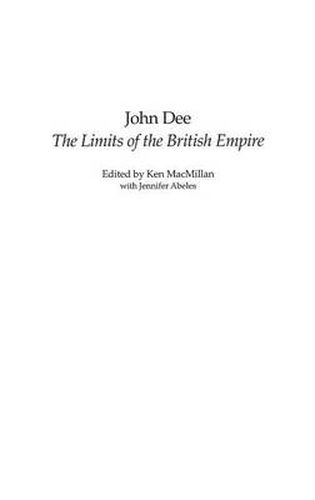Readings Newsletter
Become a Readings Member to make your shopping experience even easier.
Sign in or sign up for free!
You’re not far away from qualifying for FREE standard shipping within Australia
You’ve qualified for FREE standard shipping within Australia
The cart is loading…






When it was discovered in 1976, John Dee’s The Limits of the British Empire (1577-78) was quickly recognized as a seminal text in the history of English Atlantic discovery, settlement, and imperial ideology. Writing directly to Queen Elizabeth and drawing on ancient and contemporary history, geography, and law as his supporting evidence, Dee argued for the existence and recovery of a vast British Empire. This included much of the North Atlantic and North America, Ireland and Scotland, and even portions of Scandinavia and the Iberian Peninsula. King Arthur, Geoffrey of Monmouth, Robert the Bruce, Pope Alexander VI, Martin Frobisher, and the Emperor Justinian are just a few of the historical agents who help to make this treatise at once erudite, elegant, and effusive.
Offered for the first time in print, this volume uses sources that will be of interest to scholars in history and historical geography, English and British studies, and legal and empire studies. The book shows that Dee was an important propagandist of empire, that English antiquarianism was used to practical purpose, and that the legal foundations of the empire were not based solely on the indigenous, common law. In making these claims, this study contributes directly to several debates about the ideological development of the British Empire, especially the work of David Armitage and Anthony Pagden.
$9.00 standard shipping within Australia
FREE standard shipping within Australia for orders over $100.00
Express & International shipping calculated at checkout
When it was discovered in 1976, John Dee’s The Limits of the British Empire (1577-78) was quickly recognized as a seminal text in the history of English Atlantic discovery, settlement, and imperial ideology. Writing directly to Queen Elizabeth and drawing on ancient and contemporary history, geography, and law as his supporting evidence, Dee argued for the existence and recovery of a vast British Empire. This included much of the North Atlantic and North America, Ireland and Scotland, and even portions of Scandinavia and the Iberian Peninsula. King Arthur, Geoffrey of Monmouth, Robert the Bruce, Pope Alexander VI, Martin Frobisher, and the Emperor Justinian are just a few of the historical agents who help to make this treatise at once erudite, elegant, and effusive.
Offered for the first time in print, this volume uses sources that will be of interest to scholars in history and historical geography, English and British studies, and legal and empire studies. The book shows that Dee was an important propagandist of empire, that English antiquarianism was used to practical purpose, and that the legal foundations of the empire were not based solely on the indigenous, common law. In making these claims, this study contributes directly to several debates about the ideological development of the British Empire, especially the work of David Armitage and Anthony Pagden.